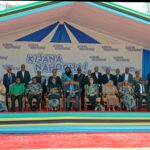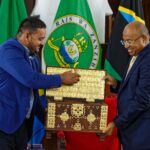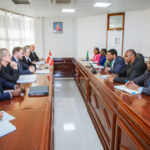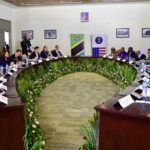The Vice President of the United Republic of Tanzania, Hon. Dr. Philip Mpango, recently participated in a prayer gathering alongside religious leaders and the general public. The event, held at Jamhuri Stadium in the Dodoma region on 22 April 2024, aimed to seek divine blessings for the nation in anticipation of its upcoming 60th anniversary of the Union. In his address following the prayers, Vice President Mpango highlighted the remarkable progress made by Tanzania over the past six decades, which has significantly improved the lives of its citizens.
The Significance of the Prayer Gathering: The prayer gathering at Jamhuri Stadium served as a unifying event, bringing together people from different religious backgrounds and walks of life. It symbolised the collective hope and aspirations of the Tanzanian nation as it approached a significant milestone in its history.
Hon. Hemed Suleiman Abdulla Participates in Prayer for the Nation to Celebrate 60th Anniversary of Tanganyika-Zanzibar Union
The Second Vice President of Zanzibar, Hon. Hemed Suleiman Abdulla, attended the Jamhuri Stadium in Dodoma to participate in the Prayer for the Nation, a significant event led by the Vice President of the United Republic of Tanzania, Hon. Dr. Philip Isdor. The occasion marked the 60th anniversary of the union of Tanganyika and Zanzibar, and brought together various leaders to commemorate this historic milestone.
The arrival of Hon. Hemed Suleiman Abdulla at the Jamhuri Stadium in Dodoma was met with great anticipation and excitement as he joined other esteemed leaders in this momentous event. The programme, which was organised to honour the enduring partnership between Tanganyika and Zanzibar, served as a platform for reflection, gratitude, and unity. The Prayer for the Nation was a solemn and dignified gathering, where leaders and citizens alike came together to offer prayers and blessings for the continued prosperity and harmony of the United Republic of Tanzania.
The presence of Hon. Hemed Suleiman Abdulla served to emphasise the significance of this occasion, demonstrating the unwavering commitment of Zanzibar’s leadership to the unity and progress of the nation. As the event unfolded, Hon. Hemed Suleiman Abdulla greeted fellow leaders and participants in a warm and friendly manner, exuding a sense of camaraderie and solidarity. His presence imbued the proceedings with a touch of grace and statesmanship, reinforcing the spirit of collaboration and goodwill that permeated the gathering.
The 60th anniversary of the union of Tanganyika and Zanzibar holds profound significance for the people of both regions, symbolising a historic coming together and the forging of a shared destiny. The Prayer for the Nation provided a poignant opportunity to reflect on the journey of unity and to reaffirm the bonds that bind Tanganyika and Zanzibar as one nation.
Hon. Hemed Suleiman Abdulla’s participation in this commemorative event not only demonstrated his personal commitment to the ideals of unity and harmony but also served as a powerful symbol of Zanzibar’s enduring partnership with Tanganyika. His presence evoked a sense of reverence and respect for the shared history and aspirations of the two regions, thereby reinforcing the bonds of unity and mutual understanding.
The Prayer for the Nation, led by Hon. Dr. Philip Isdor, Vice President of the United Republic of Tanzania, was a profoundly moving and spiritually uplifting experience, as leaders and citizens joined in prayer and reflection. The event served as a poignant reminder of the values of peace, cooperation, and solidarity that underpin the union of Tanganyika and Zanzibar, and reaffirmed the collective commitment to a shared future of progress and prosperity.
The presence of Hon. Hemed Suleiman Abdulla at the Prayer for the Nation underscored the importance of fostering a spirit of inclusivity and collaboration, transcending regional boundaries and embracing the diversity that enriches the fabric of the nation. His participation exemplified the spirit of unity and shared purpose that defines the relationship between Zanzibar and Tanganyika, inspiring hope and optimism for the future.
The 60th anniversary of the union of Tanganyika and Zanzibar stands as a testament to the enduring strength of the bond that unites these two regions, reflecting a legacy of cooperation, mutual respect, and shared aspirations. The Prayer for the Nation provided a poignant moment to honour this legacy and to recommit to the values of unity, peace, and progress that have guided the journey of the United Republic of Tanzania.
Honouring the 60th Anniversary of the Union:
As Tanzania prepares to celebrate its 60th anniversary of the Union, the prayer gathering provided an opportunity for reflection and gratitude. It allowed the nation to acknowledge the achievements and challenges faced during this period, while seeking divine guidance for the future.
Following the prayers, Vice President Mpango addressed the attendees, expressing his appreciation for their participation and emphasising the progress made by Tanzania in various sectors over the past 60 years. He highlighted the government’s commitment to improving the lives of Tanzanians and ensuring a prosperous future for the nation.
Progress in Various Sectors:
Vice President Mpango outlined the significant advancements made by Tanzania in key sectors, including:
a) Economic Development:
Tanzania has witnessed remarkable economic growth, with increased foreign direct investment, infrastructure development, and a thriving business environment. The government’s focus on industrialisation and diversification has contributed to job creation and poverty reduction.
b) Education and Healthcare:
The Tanzanian government has prioritised education and healthcare, resulting in improved access to quality education and healthcare services across the country. Efforts to enhance the education system and expand healthcare infrastructure have positively impacted the lives of Tanzanians.
Investments in infrastructure, including roads, railways, ports, and airports, have facilitated connectivity within Tanzania and with neighbouring countries. This has boosted trade, tourism, and overall economic development.
d) Agriculture and Food Security:
Tanzania’s agricultural sector has experienced significant growth, leading to increased food production and improved food security. The government’s initiatives to support small-scale farmers, promote modern farming techniques, and invest in irrigation systems have contributed to this progress.
Vice President Mpango underscored the significance of unity and national cohesion in Tanzania’s pursuit of development. He underscored the necessity for all citizens to collaborate, irrespective of their religious, ethnic, or regional differences, to construct a prosperous and harmonious nation.
Future Aspirations:
In the context of future aspirations, Vice President Mpango articulated the government’s resolve to intensify development efforts and address challenges. Furthermore, he underscored the significance of inclusive growth, sustainable development, and good governance in attaining Tanzania’s long-term objectives.
The Vice President’s appeal to uphold the values of the Nation serves as a poignant reminder of the significance of peace, unity, solidarity, dignity, justice, human dignity, freedom, and democracy. These values constitute the foundation of the Union and are essential for its continued prosperity and growth.
As the Union continues to evolve, it is of paramount importance for its citizens to remain steadfast in their commitment to these values. Such actions not only honour the legacy of the Union but also contribute to the sustenance of a society that is built on principles of inclusivity, equality, and progress.
The Union’s journey since its inception in 1964 has been marked by resilience, progress, and a steadfast commitment to its core values. The enduring spirit of brotherhood and cooperation, coupled with a sincere desire to build a society based on freedom, justice, brotherhood, and peace, has been instrumental in shaping the Union’s trajectory. The Vice President’s call to uphold the values of the Nation serves as a powerful reminder of the collective responsibility to nurture and preserve these foundational principles. As the Union continues to develop, it is of the utmost importance that its citizens remain committed to these values, thus ensuring a future characterised by unity, solidarity, and prosperity.
As the 60th anniversary of the Union draws to a close, the Vice President has emphasised the importance of accelerating development, enhancing social welfare, and addressing the various challenges that the nation faces. He has called upon all Tanzanians to assume responsibility for combating the erosion of morals, which has led to an increase in behaviours that violate Tanzanian traditions and customs, such as crime, violence, drug use, and other actions that are contrary to Islamic teachings. The Vice President has urged citizens to work in collaboration with religious leaders, the government, parents, guardians, and teachers to address these issues.
The Vice President’s message underscores the ongoing commitment to progress and social well-being in Tanzania. It serves as a reminder that despite the significant milestone of the 60th anniversary of the Union, there is still much work to be done to ensure the nation’s continued development and prosperity.
In his address, the Vice President emphasised the necessity for collective action to accelerate development. This encompasses initiatives to enhance infrastructure, expand access to education and healthcare, and create opportunities for economic growth. By prioritising these areas, Tanzania can further its progress and enhance the well-being of its citizens.
Furthermore, the Vice President’s appeal to address the erosion of morals is a crucial aspect of ensuring a harmonious and prosperous society. By promoting ethical behaviour and upholding traditional values, Tanzanians can contribute to a safer and more cohesive community. This requires collective action and a shared commitment to instilling positive values in the younger generation.
The Vice President’s emphasis on the role of religious leaders, the government, parents, guardians, and teachers in guiding this effort reflects the importance of collaboration across different sectors of society. By working together, these stakeholders can play a pivotal role in shaping the moral fabric of the nation and fostering a culture of respect, integrity, and responsibility.
It is evident that the Vice President’s message resonates with the broader goal of nurturing a society that upholds its traditions and values while embracing progress and development. By addressing the challenges posed by the erosion of morals, Tanzania can create a more conducive environment for growth and prosperity.
The Vice President’s call to action serves as a timely reminder of the ongoing commitment to advancing the nation’s development and addressing societal challenges. By working together and upholding traditional values, Tanzanians can build a brighter future for generations to come. The Vice President’s vision for a prosperous and morally upright society is a testament to the enduring spirit of progress and unity in Tanzania.
The Vice President of Tanzania reaffirmed the government’s commitment to upholding Islamic teachings in its governance. Emphasising the importance of justice, integrity, and patriotism, the Vice President outlined the government’s efforts to combat crime and prevent the misuse of public funds. He urged citizens to collaborate with relevant agencies and provide information in the event of criminal activities or financial misconduct. This call for collective action underscores the Islamic principles of accountability and social responsibility.
The Vice President’s message resonates with the core values of Islam, which emphasise the importance of justice and ethical conduct in all aspects of life, including governance. The Quran and the teachings of Prophet Muhammad (peace be upon him) provide clear guidance on the principles of justice and integrity, which are essential for a just and equitable society. In Surah An-Nisa (4:135), Allah commands believers to stand firmly for justice, even if it is against themselves or their relatives. This verse underscores the Islamic imperative to uphold justice and fairness, regardless of personal interests. Similarly, in Surah Al-Ma’idah (5:8), Allah commands believers to be just and bear witness for the sake of Allah, even if it is against themselves or their parents and relatives. These teachings emphasise the ethical responsibility of individuals to uphold justice and integrity, even in the face of personal challenges.
The Vice President’s call for collaboration between all sectors of society reflects the Islamic concept of “shura,” or consultation, which is encouraged in matters of governance and decision-making. The Quran states, “And those who have responded to their lord and established prayer and whose affair is [determined by] consultation among themselves, and from what We have provided them, they spend” (Surah Ash-Shura, 42:38). This verse highlights the importance of mutual consultation and collaboration in addressing societal issues and making decisions that affect the welfare of the community. Furthermore, the Vice President’s emphasis on patriotism aligns with the Islamic concept of “hubb al-watan,” or love for one’s country.
Islam encourages believers to be loyal and devoted to their homeland, provided that it does not conflict with their faith. The Prophet Muhammad (peace be upon him) is reported to have said, “Love of one’s homeland is a part of faith” (Sunan Ibn Majah). This hadith serves to illustrate the Islamic value of patriotism and the importance of serving one’s country with dedication and sincerity.
In light of these Islamic teachings, the government’s commitment to combat crime and prevent the misuse of public funds can be seen to reflect its adherence to the principles of justice, integrity, and accountability. The Vice President’s exhortation to citizens to report criminal activities and financial misconduct is consistent with the Islamic concept of “amr bil ma’ruf wa nahy anil munkar,” or enjoining good and forbidding evil. This principle underscores the obligation of individuals to promote righteousness and prevent wrongdoing in society.
The Government’s Appreciation of Religious Institutions in Tanzania
The Vice President of Tanzania recently expressed the government’s recognition and appreciation of the positive collaboration between the government and religious institutions in the country. This collaboration has been acknowledged as constructive and valuable, and the government is committed to further fostering this partnership for the benefit and well-being of the nation.
The Vice President expressed gratitude to all religious leaders in the country for their continuous prayers for the nation and their efforts to denounce evil, promote good values, and provide spiritual and social services to Tanzanians. Additionally, he commended the religious leaders for their invaluable contribution to maintaining national unity and fostering cooperation, despite differences in religion, ethnicity, race, political affiliation, and geographical origin.
The government’s acknowledgment of the significant role played by religious institutions in the country reflects a commitment to inclusivity and cooperation. The Vice President’s statement underscores the importance of recognizing and nurturing the positive impact of religious institutions on the social, spiritual, and moral fabric of Tanzanian society.
The collaborative efforts between the government and religious institutions are aimed at promoting the well-being of the nation. The government’s commitment to fostering this collaboration is a testament to its recognition of the positive influence of religious institutions in addressing social, spiritual, and moral challenges in the country.
The Vice President’s expression of gratitude towards religious leaders for their continuous prayers for the nation highlights the importance of spiritual guidance and support in the development and progress of the nation. The government’s acknowledgment of the efforts made by religious leaders to rebuke evil and promote good values reflects a shared commitment to upholding moral and ethical standards in Tanzanian society. Furthermore, the government’s recognition of the invaluable contribution of religious leaders to maintaining national unity and fostering cooperation is a testament to the inclusive approach adopted by the government. This acknowledgment reflects a commitment to embracing diversity and promoting unity, despite differences in religion, ethnicity, race, political affiliation, and geographical origin.
The government’s commitment to fostering collaboration with religious institutions is indicative of its dedication to promoting the well-being and prosperity of the nation. The acknowledgment of the positive role played by religious leaders in providing spiritual and social services to Tanzanians underscores the importance of recognizing and supporting the efforts of religious institutions in addressing the needs of the community.
The government’s acknowledgment and appreciation of the constructive collaboration with religious institutions in Tanzania reflect a commitment to inclusivity, unity, and the well-being of the nation. The Vice President’s statement highlights the government’s recognition of the positive impact of religious institutions on the social, spiritual, and moral fabric of Tanzanian society. This acknowledgment underscores the importance of fostering collaboration and cooperation between the government and religious institutions for the benefit and progress of the nation.
On 22 April 2024, Tanzanian leaders and citizens assembled at the Jamhuri Stadium in the Dodoma region to commemorate the 60th anniversary of the Union between Tanganyika and Zanzibar. The event, which included prayers for the nation, attracted a considerable number of attendees, reflecting the significance of the occasion.
The commemoration of this historic union serves as a poignant reminder of the unity and strength of the Tanzanian people. The union of Tanganyika and Zanzibar 60 years ago established the foundation for a shared destiny, and this milestone anniversary provides an opportunity for reflection and celebration. The event at Jamhuri Stadium was a testament to the enduring spirit of unity and solidarity that has defined the Tanzanian nation. Leaders from across the country, as well as citizens from all walks of life, gathered to pay tribute to the historic Union and to reaffirm their commitment to a shared future.
The commemoration commenced with solemn prayers for the nation, underscoring the importance of faith and unity in guiding Tanzania forward. The prayers served as a powerful symbol of the nation’s resilience and determination to overcome challenges and build a prosperous future for all its citizens. As the event unfolded, the atmosphere was filled with a sense of pride and reverence for the Union’s legacy. Speakers highlighted the achievements and progress made possible by the Union, emphasising the importance of preserving and cherishing the unity that has been the cornerstone of Tanzania’s success. The anniversary celebration also provided an opportunity to recognise and honour the contributions of individuals and communities who have played a pivotal role in advancing the ideals of unity and cooperation. From grassroots activists to national leaders, the event showcased the diverse and unwavering commitment to upholding the Union’s principles.
In addition to the formal proceedings, the commemoration at Jamhuri Stadium featured cultural performances and displays that showcased the rich diversity and heritage of Tanzania. These events celebrated the vibrant tapestry of traditions that contribute to the nation’s unique identity through music, dance, and art.
The significance of the 60th anniversary of the Union between Tanganyika and Zanzibar extends beyond the confines of the event itself. The commemoration serves as a reminder of the enduring values that have guided Tanzania through its history and will continue to shape its future. As the commemoration drew to a close, there was a palpable sense of optimism and determination among the attendees. The event had reaffirmed the unity and resilience of the Tanzanian people, inspiring a renewed sense of purpose and commitment to building a brighter future for generations to come.
The 60th anniversary of the Union between Tanganyika and Zanzibar was a momentous occasion that brought together leaders and citizens to reflect on the nation’s history and reaffirm their commitment to unity and progress. The commemoration at Jamhuri Stadium was a powerful testament to the enduring spirit of the Tanzanian people and their unwavering dedication to a shared future. As Tanzania embarks on the next phase of its development, the legacy of the Union will continue to serve as a beacon, illuminating the path ahead and inspiring the nation to persevere through challenges and seize opportunities with unity and determination.
Conclusion:
The prayer gathering, led by Vice President Mpango, served as a powerful reminder of the unity and resilience of the Tanzanian nation. As Tanzania approaches its 60th anniversary of the Union, it is essential to reflect on the progress made and the challenges that lie ahead. With continued dedication and collective efforts, Tanzania can build a brighter future for its citizens, guided by the principles of unity, development, and prosperity. The Evolution of Unity and Solidarity in the Union
Since its establishment in 1964, the Union has undergone continuous improvement, overcoming various challenges through joint negotiations and fostering harmony and solidarity within the nation. This success is attributed to the enduring brotherhood and cooperation of the people on both sides of the Union, as well as their sincere desire to build a society based on the principles of freedom, justice, brotherhood, and peace.
The Vice President has emphasised the importance of respecting and upholding the core values of the Nation, including peace, unity, solidarity, dignity, justice, human dignity, freedom, and democracy. The Union, formed in 1964, has demonstrated a remarkable trajectory of progress and development. Over the years, it has navigated through numerous challenges, all of which have been effectively addressed through collaborative negotiations. This approach has not only strengthened the Union but has also contributed to the cultivation of harmony and solidarity within the Nation. The success of the Union can be largely attributed to the unwavering brotherhood and cooperation of the people on both sides. This enduring spirit of collaboration has been a cornerstone of the Union’s progress and has played a pivotal role in shaping the society based on the fundamental principles of freedom, justice, brotherhood, and peace.
The participation of Hon. Hemed Suleiman Abdulla in the Prayer for the Nation in commemoration of the 60th anniversary of the union of Tanganyika and Zanzibar exemplified the spirit of unity, collaboration, and shared destiny that defines the relationship between these two regions. His presence added a touch of grace and statesmanship to the event, underscoring the enduring commitment of Zanzibar to the unity and prosperity of the nation. The event served as a powerful reminder of the values of peace, cooperation, and solidarity that underpin the union of Tanganyika and Zanzibar, and reaffirmed the collective commitment to a shared future of progress and prosperity.
Tanzania Media
- Kanyala Ferry Launch: TEMESA’s New Service for 15,000 Sengerema Residents (Mwanza) - 18 August 2025
- Russia-Tanzania Naval Cooperation: How the Smolny Training Ship Boosts Dar es Salaam’s Maritime Security - 18 August 2025
- Tanzania’s ICGLR Commitment: Stabilising the DRC & Great Lakes Region - 18 August 2025

















































